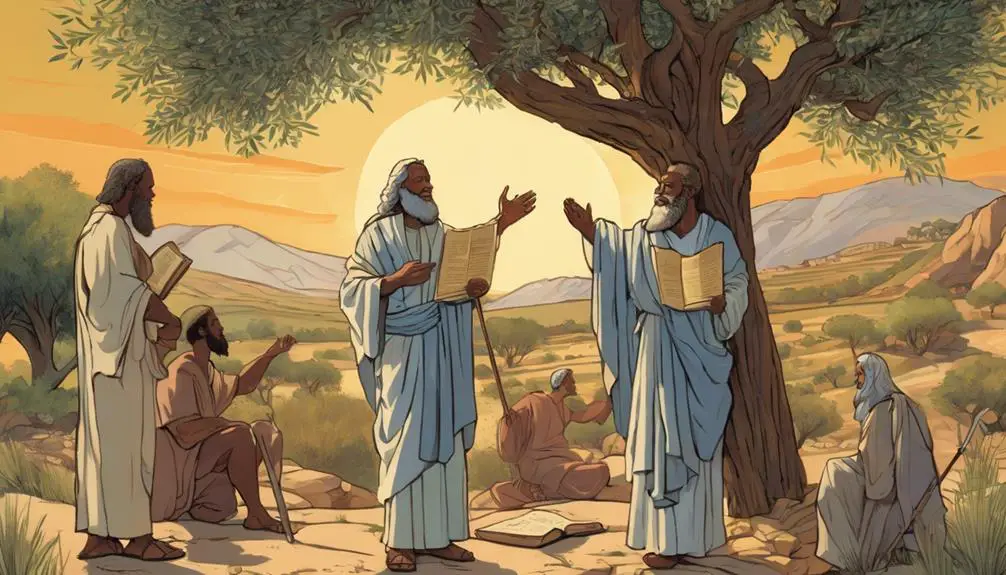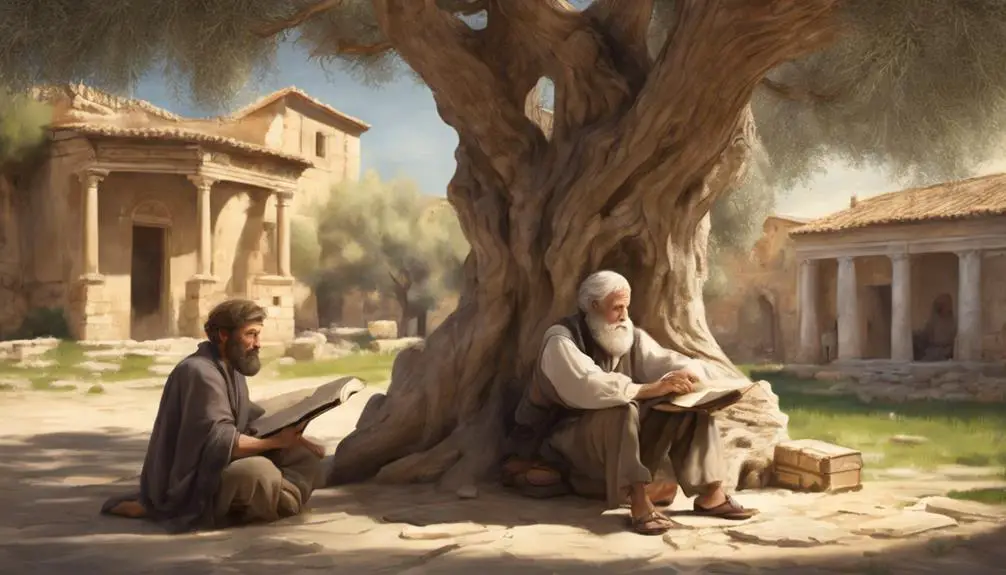Explore how iconic biblical mentorships, like Moses and Joshua, offer timeless wisdom for modern-day guidance and leadership development.

Examples of Mentors in the Bible
You've probably heard the theory that mentorship isn't a modern concept, and a glance at the Bible quickly confirms this. Figures like Moses guiding Joshua, Eli nurturing Samuel, and Paul advising Timothy showcase a tradition of wisdom and leadership passed down through generations.
Each pairing reveals unique dynamics and lessons in mentorship that resonate even today. As you explore these relationships further, you'll uncover how they not only shaped individuals but also entire communities.
The question that might linger in your mind is, how can these ancient mentorships inform our current practices and relationships?
Key Takeaways
- Biblical mentorship spans leadership skills, spiritual guidance, and personal growth.
- Mentor-mentee relationships in the Bible often focus on legacy and continuity.
- Prophetic succession illustrates the transfer of divine authority and gifts.
- Examples include Moses mentoring Joshua and Elijah passing authority to Elisha.
Moses and Joshua

Moses, one of the most pivotal figures in biblical history, served as a crucial mentor to Joshua, shaping him into a leader equipped to guide the Israelites into the Promised Land. This leadership transition wasn't merely a change of command; it symbolized a profound passage of wisdom, faith, and divine guidance. Moses, known for his close relationship with God and his role in leading the Israelites out of Egypt, didn't just provide Joshua with military or administrative advice. Instead, he instilled in him the importance of reliance on divine guidance, a lesson underscored by the miraculous events they witnessed together, such as the parting of the Red Sea.
Your understanding of this mentorship is deepened by recognizing that Moses' guidance was both practical and miraculous. He demonstrated to Joshua how to navigate leadership challenges, not just by human wisdom but through seeking divine intervention. This blend of practical leadership skills and spiritual reliance was essential for Joshua as he faced the task of conquering Canaan. The mentorship between Moses and Joshua, thus, wasn't merely about transferring authority; it was about embedding the understanding that miraculous guidance was integral to their success.
Eli and Samuel

Shifting our focus, we now examine the mentorship between Eli and Samuel, a relationship that epitomizes the transmission of prophetic and priestly duties within the complex socio-religious landscape of ancient Israel. Eli, as the high priest, plays a pivotal role in ushering Samuel into his God-ordained destiny. This mentorship not only highlights the individual roles of Eli and Samuel but also underscores the seamless handover of spiritual leadership.
Aspect |
Eli and Samuel's Mentorship |
|---|---|
Foundation |
Eli's priesthood |
Catalyst |
Samuel's calling |
Transmission |
Prophetic and priestly duties |
Outcome |
Seamless leadership handover |
Significance |
Socio-religious impact |
Eli's mentorship is characterized by nurturing Samuel's early encounters with God, guiding him through the complexities of hearing and responding to God's voice. This pivotal moment in Samuel's life marks the beginning of his calling, setting the stage for his future role as a prophet and judge over Israel. Through Eli's guidance, Samuel learns the importance of obedience, discernment, and the sacredness of his duties, ensuring the continuity of God's work among His people. This mentorship exemplifies the critical role of seasoned leaders in shaping the spiritual destinies of their protégés.
Naomi and Ruth

Turning our attention to the story of Naomi and Ruth, we encounter a profound example of mentorship that transcends familial bonds, reflecting significant socio-religious themes within the wider narrative of the Hebrew scriptures. Naomi, a widow in a foreign land, becomes not only a mother-in-law to Ruth but a pivotal mentor, guiding her through the complexities of integrating into a new cultural and religious context. Ruth's loyalty to Naomi, exemplified by her famous declaration of solidarity, underscores the depth of their bond and the mutual commitment that forms the foundation of their relationship.
This mentorship facilitates Ruth's cultural integration, as Naomi instructs her on the customs and laws of the Israelites, ensuring her successful assimilation and eventual marriage to Boaz. Through Naomi's guidance, Ruth navigates the intricate social and legal landscapes of her new environment, achieving a remarkable transformation from a foreign widow to a respected member of the community and an ancestor of King David.
The narrative highlights the transformative power of mentorship, illustrating how guidance, wisdom, and unwavering support can foster personal growth, resilience, and integration within unfamiliar socio-religious contexts.
Elijah and Elisha

In the mentor-protege relationship between Elijah and Elisha, we observe a dynamic interplay of spiritual leadership and legacy within the prophetic tradition of the Hebrew scriptures. This partnership is a prime example of prophetic succession and miracle inheritance, showcasing how wisdom and divine power transition from one generation to the next.
Here are four key elements of their relationship:
- Call to Service: Elisha's calling, where Elijah throws his mantle over him, symbolizes the passing of prophetic authority. This moment signifies Elisha's initiation into a life dedicated to serving God under Elijah's mentorship.
- Miracle Inheritance: Elisha requests a double portion of Elijah's spirit, a request that underscores the desire for a profound spiritual inheritance. This moment highlights the importance of miracles in their prophetic ministry.
- Prophetic Succession: Elijah's departure in a whirlwind, leaving his mantle for Elisha, marks the official transfer of prophetic leadership. This act solidifies Elisha's position as Elijah's successor.
- Continuation of Ministry: Elisha's subsequent miracles, which echo those of Elijah, illustrate the continuation and expansion of Elijah's ministry through Elisha. This continuity exemplifies the mentor's influence extending beyond their presence.
In analyzing their relationship, you're invited to reflect on the essence of mentorship, legacy, and the transmission of divine gifts across generations.
Paul and Timothy

Reflecting on the mentor-protege dynamic seen between Elijah and Elisha, we now explore the relationship between Paul and Timothy as another profound example of spiritual mentorship within the biblical narrative. Paul's role in Timothy's development goes beyond mere companionship; it embodies epistolary guidance and spiritual fatherhood, underscoring a deep, instructive connection that transcends physical presence.
Paul's letters to Timothy, primarily the First and Second Timothy, offer a treasure trove of insights into this unique relationship. They reveal Paul's dedication to grooming Timothy not just as a follower but as a leader in his own right. This epistolary guidance serves as a critical tool in Timothy's spiritual and pastoral development, demonstrating the power of mentorship carried out through written communication.
Moreover, Paul often refers to Timothy as his 'true son in the faith,' which highlights the depth of their bond. This terminology isn't used lightly, signifying a level of spiritual fatherhood that Paul held. It wasn't merely about teaching Timothy but nurturing him in faith, embodying a holistic approach to mentorship that included personal growth, spiritual guidance, and professional development within the ecclesiastical context.
Frequently Asked Questions
How Do Modern Psychological Theories on Mentorship Align With the Mentor-Mentee Relationships Observed in the Bible?
You'll find that modern psychological theories on mentorship, particularly those focusing on attachment styles and psychological resilience, offer intriguing parallels to mentor-mentee dynamics traditionally seen.
These theories suggest that effective mentorship involves fostering secure attachment styles and building resilience, elements that are evident in historical mentor-mentee interactions.
Analyzing these relationships through a scholarly lens reveals a profound alignment between ancient wisdom and contemporary psychological insights on nurturing growth and resilience in mentees.
Were There Any Notable Female Mentors in the Bible Aside From Naomi, and What Roles Did They Play in Guiding Others?
You're exploring notable female mentors beyond Naomi. Consider Deborah's leadership, which exemplified wisdom and courage, guiding Israel through tumultuous times. Her role as a judge and prophetess showcases how women's guidance was pivotal in biblical narratives.
Meanwhile, Priscilla's teachings alongside her husband, Aquila, significantly impacted early Christianity. Her involvement in educating others, including Apollos, highlights the indispensable role of women in mentorship and religious instruction within the early church.
How Did Cultural and Societal Norms of the Times Influence the Mentoring Styles of Biblical Figures Compared to Today's Standards?
In analyzing how cultural and societal norms influence mentoring styles, you'll find that cultural adaptation and societal influence heavily shape these methods. Today's standards, often promoting individualism and digital communication, contrast with past norms where mentoring was deeply personal and reflective of societal hierarchies.
Understanding these dynamics reveals a complex evolution, where mentors adapt their approaches based on cultural expectations and the available tools for communication and knowledge sharing.
Can the Concept of Mentorship in the Bible Be Applied to Non-Religious Contexts, and How Might It Differ in Secular Settings?
Absolutely, the concept of mentorship can transcend religious contexts, including in secular settings. Cross-cultural applicability and secular adaptation strategies enable these ancient mentorship models to be relevant today.
You'll find that while the core principles of guidance, support, and wisdom remain unchanged, the application might differ—focusing more on professional and personal development rather than spiritual growth. This adaptation ensures that the essence of mentorship is preserved across various contexts.
What Are the Long-Term Impacts on Communities or Nations as Depicted in the Bible Resulting From Effective Mentorship, Beyond the Immediate Relationships Described?
You've asked about the broader impacts of mentorship, specifically regarding nation-building efforts and community transformation. Effective mentorship can lead to remarkable changes. It fosters leadership qualities, encourages ethical behavior, and promotes social cohesion.
Over time, these elements are crucial for nation-building and transforming communities. By nurturing skills and values, mentorship contributes to a stronger, more unified society, demonstrating its significant, long-term benefits beyond individual relationships.
Conclusion
In analyzing the mentorship examples from the Bible, it's evident that these relationships were pivotal in shaping the spiritual, moral, and leadership qualities of the mentees.
Moses, Eli, Naomi, Elijah, and Paul didn't just impart knowledge; they instilled a legacy that transcended generations.
Their mentorship, deeply rooted in faith and wisdom, showcases a timeless framework for nurturing growth.
These biblical narratives highlight the profound impact mentorship can have on individual development and the broader community, underscoring its enduring significance.



Sign up